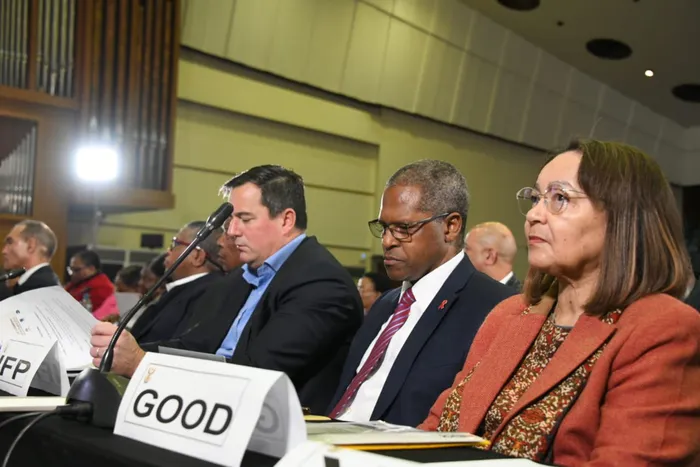A new governance framework critical for political stability

Picture: GCIS - Political party leaders attend a coalition dialogue in Cape Town. In principle, there is nothing wrong with coalition governments, especially because they have worked well in other countries such as Australia, Denmark, India and Germany, among others, the author writes
By Prof. Bheki Mngomezulu
When South Africa became a democracy in 1994, history was made. The ecstasy or euphoria that engulfed the country was understandable. Never had the country organised elections wherein everyone participated, regardless of race.
What the country did not anticipate was that the number of political parties would increase exponentially. Since 1994, the number of political parties has increased in an alarming rate in each election.
While this is a good sign for democracy, there are several unintended consequences. One of them is that more and more people are forming political parties with no clear policy deviation to the pre-existing ones. As a result, political parties are mushrooming but they have little (if anything at all) to offer.
The main consequence of this is that it is becoming more and more difficult to form a government at all three spheres (national, provincial, and local). This has necessitated the formation of coalition governments.
In principle, there is nothing wrong with coalition governments, especially because they have worked well in other countries such as Australia, Denmark, India and Germany, among others. Some of the coalitions are formed by bigger parties, which is referred to as “Grand Alliances”. Others are formed by smaller parties and are referred to as “minority coalitions”.
Unfortunately, South Africa has not been able to handle coalition governments. Political instabilities in municipalities such as Nelson Mandela Bay, Johannesburg, Tshwane and Ekurhuleni are testimony to the reality. There are also local municipalities where the coalitions have proved to be unsustainable.
The main reason is that until now, the coalitions have not been regulated. There has been no formal framework to control the coalitions. As a result of the situation, political parties with one to three seats at any of the three spheres of government have been dictating the terms for bigger parties.
They make huge demands such as demanding the position of deputy mayor, municipal manager and many such influential positions. In the national and provincial spheres, they choose which ministerial or MEC positions they want from the party that has more support.
This is a nemesis to democracy in many ways. The party with fewer seats decides for the party with the most seats. This means that the will of the electorate is undermined. In such a situation, democratic principles are compromised.
Against this backdrop, the decision to hold a national dialogue on coalition governments is long overdue. When the announcement was made that Deputy President Paul Mashatile was going to hold a two-day national dialogue to discuss the issue of coalition governments, the decision marked a leap forward.
The meeting, which took place on Friday and Saturday in Cape Town, could not have come at a better time. This is undoubtedly a rational decision. A quick analysis of the national election results from 2014 and 2019 shows that the ANC, as the governing party, and the DA, as the official opposition party, have been on the decline in terms of support. At the local government level in 2016, and 2021, the same trend became discernible.
On the other hand, political parties such as the EFF, IFP and the Freedom Front Plus (FF+) have shown signs of growth. But this upward trajectory does not mean that any of the growing political parties stand a chance of removing the ANC from power. All they can do is reduce its majority, to the extent that there might be a need for a coalition government next year.
Drawing from the experiences cited earlier, and in the absence of a coalition government framework, the country could descend into chaos. It is for this reason, therefore that this national dialogue on coalition governments is necessary. This discussion is important in the present context and in preparation for the 2024 general election. After this election, there will be a need to revisit the Electoral Act.
One of the key questions to be addressed is whether the act assists the country in managing coalition governments. If the answer is in the negative (which is what it is), the need to legislate coalitions is urgent if political chaos in the country is to be averted.
Another question becomes: Will the two-day dialogue produce the intended results? The answer lies in the political maturity of all political parties. As the prospects for coalition governments are becoming real for next year, it would be foolhardy not to agree on a framework that would guide political parties when forming coalitions.
A subtle question is whether the Proportional Representation (PR) system is indeed helping the country. One may argue that it is good because it gives a voice to smaller parties. But it also increases the prospects for coalition governments. Therefore, the dialogue is necessary and timely.
*Prof Bheki Mngomezulu is director of the Centre for the Advancement of Non-Racialism and Democracy at the Nelson Mandela University.